Sherlock Holmes and the Shakespeare Globe Murders Read online
Page 15
Now I realise they are all waiting for me to do something but I am tongue tied. Then I hear the voice of Mrs Hudson saying—“I hate to disturb you, Doctor, but there’s a gentleman come to pay his respects. It’s Mr Adler. What am I to say?” I struggled through the mists of sleep back to reality.
As my eyes began to focus, I saw that Mrs Hudson was dressed entirely in black and the events of the previous evening came flooding back. As if reading my mind, she held out a copy of the morning paper. One of the leading stories was headlined—“SHERLOCK HOLMES DEAD! DETECTIVE KILLED IN TRAGIC ACCIDENT.” The rest of the story had obviously been provided to the reporter by Lestrade and told how, in the hurry to finish the theatre for this evening’s gala opening, workmen had failed to adequately secure certain building materials, which had then fallen on to the temporary stage just as the famous detective was crossing it. What he was doing there was not made clear. This appalling accident, etc., etc.
Mrs Hudson interrupted my reading. “There’s Mr Adler to see you, Doctor, if you’re feeling up to it. Mr Mycroft had a word with me last night before he left. He said we must all carry on as normal. It’s as Mr Holmes would have wanted it. But it’ll be dreadful hard, Doctor—dreadful hard.” She seemed about to say something else but her emotions overcame her and putting her apron up to her eyes, she fled the room.
My heart went out to the poor soul. For all her scolding, I knew her to be devoted to Holmes. In many ways we were both the sons to her that she had never had and now one of them was gone—once more. For myself my overriding sensation was one of numbness—the lingering effects of the sedative, I assumed. Slowly and methodically I concentrated on dressing to face the bleakness of the day ahead.
A few minutes later I was shaking Florenz Adler’s hand. Just as the impresario had shown himself capable of appearing larger than his real size, now he seemed to have shrunk. The fight had gone out of him. “Doctor, I owe you an apology. Holmes, too, if only he were here to hear it If I hadn’t been so pigheaded about building this crazy theatre …”
“Come, Adler,” I said, summoning up as much conviction as I could, when all I really wanted to do was sit and feel sorry for myself, “you mustn’t blame yourself for the actions of a maniac. You may have found yourself the lightning conductor but you’re certainly not the lightning.”
“At least lightning strikes cleanly,” said Adler bitterly. “Allan skulks around in the dark.” Then seeing the dawning surprise on my face, he quickly added—“Yes, Mr Holmes has taken me into his confidence—‘posthumously.’” And he tapped a bulky document I now noticed in his jacket pocket. “When I got back to the hotel after …” he didn’t need to complete the sentence—“I received a visit from Mr Holmes’s elder brother …” Mycroft, I reflected, had indeed been busy. “He said he had been given a note to deliver to me in the event of anything happening to Mr Holmes. In it he gave me the outline of what he knows—knew—and asked me to be sure the show went on as planned. He said it was the only way we had any chance to contain Allan and possibly unmask him … force him into doing something to give us the evidence we need to bring him to justice.”
“It goes without saying, Doctor, that I shall do as he asks, if only out of respect for his memory. And, Doctor, don’t think me heartless if I haven’t said the right thing about him but for once I’m plumb out of the right thing to say. Forgive me.” There was a moment of silence and in that moment I felt closer to the man than I had so far.
It was the impresario who spoke first. “After last night I was beginning to wonder if I had the right to continue but Holmes’s note has taken that decision out of my hands. Even so, a couple of things keep nagging at the back of my mind. In his letter Holmes insists that, whatever other cast changes I may be forced to make, Carlotta must appear as Gertrude. Now, frankly, she was devastated by what happened and I’d intended to keep her out of harm’s way but, as soon as I told her what Holmes had said, she point blank refused to have any of it. She insists on appearing, so that’s that.”
“You said two things bothered you?”
“Yes. How in blazes did Allan manage to kill Holmes? Surely he was with one or more of us all evening?”
Immediately my mind replayed the snapshots of those frenzied moments. Where had we seen Allan and when? He’d arrived at the Globe after the Adlers and myself but surely he’d been in the cab with Carlotta and Phipps? Could he have left them long enough to set up the device that trapped my friend? But then he had interrupted my conversation with Lestrade. And I recalled his quoting the Ophelia speech. After I heard the shot my impression of things went by in a blur. Who had fired a revolver? Not Holmes, for he wasn’t carrying one to the best of my knowledge. The man in the gallery that I shot at? Did he sever the rope with a bullet? I made a mental note to ask Lestrade. And had Allan had time in the confusion to reach the gallery by another entrance before we entered the wooden ‘O’?
My dulled brain couldn’t cope with all the complexities involved. In any case, what did it matter? My friend was dead and all that now mattered was that Allan be brought to book.
A few minutes later Adler left. As I went to shake his hand, he took mine in both of his. “Until this afternoon, Doctor. As Holmes said—we all have our parts to play and, God willing …” I was still standing there when the door below banged shut.
I went to the sideboard and, regardless of the time of day, poured myself a large whisky and soda, which I took over to my chair. It seemed strange to be sitting opposite Holmes’s empty chair, knowing he would never occupy it again. When this business was over, I should have the macabre duty of shutting up these rooms, the scene of so many triumphs and tragedies. How could one pack up so much history, so many memories? But that was tomorrow’s task. Today we must play out the game to whatever conclusion was intended. After which, I should make it my business to hound Edward Allan to the ends of the earth, if need be.
I determined to think things through as Holmes would have done. What did we know and what might we infer? We knew the identity of the killer and we had good reason to believe—with this added conviction of Freud’s professional analysis—that his frenzy was building to some kind of crescendo, exacerbated by Adler’s stubborn refusal to abandon his Globe project. Allan’s madness—I had to keep thinking of him as Allan or lose my own grip on events—had now transcended the idea of the Globe versus the Rose and become morbidly attached to the people involved.
Carlotta was now effectively Gertrude and must be punished in some way for betraying his unknown natural father with Adler, now irrevocably cast as Claudius. So that the plot must be played out. Was Hamlet the key to everything? And what about the death of Holmes? Had the Dame Ivy episode triggered thoughts of Polonius, as Holmes had suggested? And had Holmes himself become the next ‘wretched, rash, intruding fool’ in Allan’s demented drama? Where did the real Queen fit in? Was she to pay for an earlier queen’s failure to prefer the Rose to the upstart Globe?
It was then that I realised that we were soon to have many of those answers provided for us without further effort on our part. There was a sinking feeling in my stomach as I remembered part of the previous evening’s dinner conversation. Asked if he had decided on the running order for the gala performance, Adler had replied that he intended to ‘open the show with a bang’ by staging the duel scene—from Hamlet! If I was to serve Holmes’s memory it would have to be through some form of action not theory. In a strange way the thought gave me comfort.
I decided that to preserve my sanity I needed to get out of the house for a while and pass among ordinary people who behaved in a simple, straightforward way, saying what they believed and living by decent, simple values.
As I finished dressing, I noticed a plain black band that Mrs Hudson had tactfully provided. Slipping it on my arm almost caused me to lose my carefully contrived composure. Holmes’s ‘death’ at Reichenbach had been a clean, cold shock but this was somehow worse.
I am nothing if not a creature of
habit and it occurred to me that the routine of lunching at my club might well provide the necessary discipline to get me through this day. In that I was soon proved wrong. The food was like sawdust in my mouth and the condolences of my fellow members, whether expressed or implied, soon became more than I could bear. Leaving the table with as much dignity as I could muster, I decided to take a walk through St. James’s Park.
Whatever the rest of the day might hold, the Globe would have magnificent weather for its rebirth. The sun was warm on the skin and seemed to have brought everyone out of doors. There were couples walking arm in arm, the ladies still bright in their summer dresses. Nannies perambulated their charges, the more adventurous allowing them to feed the ducks. Dotted among the crowd were occasional military uniforms. The news from South Africa was worsening by the day and I knew enough to recognise their insignia and tell that these were men most likely enjoying their last days before their ship sailed. It brought back memories of my own service days and suddenly some of the warmth seemed to go out of the sun.
I decided to sit on one of the benches and look out over the lake for a few minutes. I must have been off in a world of my own, when I heard a voice say—“Doctor Watson, may I interrupt you for a few moments?”
I looked up to find Simon Phipps standing in front of me and with him, slightly holding back, Pauline French. They both looked tired and nervous and I had the distinct impression from her body language that the girl had been encouraging him to make the approach. It was hard to say which of us was the more awkward, as I rose and raised my hat to Miss French.
“Most certainly,” I replied, indicating that they should join me on the seat. Now that he had plucked up his courage to speak, there was no stopping Phipps. The strain of the previous evening was entirely gone. Here was a man who had decided to tackle his personal demons and take his chances. For the first time I saw something behind the facade he’d been constructing and I fancy I know enough about women to venture a guess that Miss French had something to do with the change in him.
“Doctor Watson,” he burst out, “I behaved like an absolute fool last night. I thought that I had the cares of the world on my shoulders and it was only when that terrible business with Mr Holmes and nearly losing Pauline …” As I tried to summon up the appropriate expression, I couldn’t help but notice her place her hand reassuringly on his arm. My instincts on that first meeting at the Globe had been correct after all.
“I’ve been awake all night thinking things over and then, when they let Pauline come home this morning, I went round and told her everything …” “And I said he should talk to you,” that lady added.
In the next half hour it all came pouring out. His experiences in the United States, the saloon brawl and the accidental death that resulted. How he arrived in England and was accepted by Adler for the new Globe company and a corner seemed to have been turned. He described how he and Pauline had met and become attracted to one another. At which point Miss French smiled and I could well see why.
“But then it all started to unravel, Doctor.” The strained look started to creep back into his face. “Ted Allan—or whatever his infernal name is—joined the company and he was soon in cahoots with Dame Ivy. They clearly found they had some interest in common—don’t ask me what. Then one day Allan takes me aside and makes it clear that he knows all about San Francisco and maybe Flo Adler and the local police here might like to know, too. Oh, don’t worry, Doctor,” he interpreted my questioning glance, “I’ve told Pauline everything.”
“Well, the last thing I want to do is to open that can of worms over again. I could lose everything I’ve got”—and he looked at Pauline—“or hope to have. To cut a long story short, I was weak. He said he might need help with his Grand Plan—I swear that was the phrase he used. His Grand Plan. He never told me what it was. He saw me as just a spear carrier, I suppose. Dame Ivy was clearly Lady Macbeth or something equally imposing. He said he’d let me know when it was my turn to enter. He talked like that.
“Doctor, he is really strange. One moment he can be quite normal and a perfectly charming, intelligent man. Then, in the middle of a sentence a look will come into his eye and he’s suddenly someone quite different I tell you this, he scares me a whole lot more than that man in the San Francisco bar! I tried to put it all to the back of my mind—and then this Fiske business came up.
“One evening I was handed a message scribbled on a piece of paper—I think I still have it somewhere. It was from Allan telling me to come to some public house right away and some quotation—he was always quoting Shakespeare—about ‘It is the cause, my soul.’ Something like that. Othello, I think, but it doesn’t matter. I arrived to find he’d got Fiske completely drunk. He pretended it was all a big joke. Ham wanted to find a new way to play Richard the Third and we were going to help him. Anyway, we got him into that square and propped him up on the statue. Then I left them to it. I couldn’t get out of there fast enough.
“Well, as you know, it turned out that there was more to it than that. And if the police say I was an accessory … Oh, don’t worry, Doctor, as soon as today’s over, I’m going to see them … well, I expect I’ll have a hard time proving otherwise.
“And then, of course, there was Oxford. That was Allan again, wanting to know what you and Mr Holmes were up to. ‘They come not single spies, but in battalions,’ he said, which I thought a strange way of putting it. I fancied myself quite a good actor but Mr Holmes spotted me in a moment. I only wish he were here so that I could apologise to him, too.
“And there you have it, Doctor. Please don’t say anything. I know what I have to do. I just wanted you to know and when we called at Baker Street, your housekeeper was kind enough to let us know where we might find you. I think she realised our business was pretty urgent. So we waited outside your club and—here we are. Thank you for listening so patiently.”
He seemed to have finished unburdening himself but before I could say anything by way of response, he blurted out—“Look, I know this is the last thing you need right now but you know so much about these things after all your years with …” He didn’t complete the sentence. “Aren’t the police going to do something to stop this maniac? I know a man’s guilty until he’s proved innocent but I’d swear he did something to Ham Fiske, he must have killed poor old Ivy and then last night … I’ve wracked my brains all night but I still can’t work out how he did it … those men he must have hired to drown Pauline and then Mr Holmes …” His voice trailed away and I heard myself saying with a lot more confidence than I felt—“Don’t worry, Mr Phipps. Allan will not evade the long arm of justice. The police and I have planned for every eventuality. Even now the net is tightening.” At my back I could almost hear Holmes whispering—“Watson, you really must avoid using so many cliches in your little narratives.” The thought almost caused me to miss what Pauline French was saying.
“Simon, be a dear and let me have two minutes with Doctor Watson, will you?” With a boyish gesture Phipps reached out his hand and shook mine, rather as a schoolboy would take his leave from his headmaster at the end of term. A few moments later he had taken up a position a few yards away, leaning on a railing and watching the ducks for which the park is justly famous.
“Doctor, I’m well aware that everything is going to come out in the next few hours, so I’m probably worrying you unnecessarily but could you please put my mind at rest on one thing? I haven’t said anything about this to anyone, not even Simon, because I promised I wouldn’t, but since you obviously know about it anyway … why did Mr Holmes and Inspector Lestrade arrange for me to pretend to be drowning last night?”
I didn’t believe anything more could happen to surprise me in my present state but I was woefully wrong. In a flash I realised that—in my grief over the death of Holmes—I hadn’t given a though to ‘Ophelia’s’ drowning. Of course. How could Allan have arranged it, unless—as Phipps suggested—he had hired someone to do it for him? And yet I would have sworn
that it was Allan’s style to act alone and almost certainly motivated by impulse. So Holmes and Lestrade had contrived the incident, presumably to shock Allan into thinking he was not alone in opposing the Globe and perhaps destabilise his dementia until they had gained enough time to get past the royal opening and gather enough evidence to arrest him? So Pauline French had been Holmes’s mystery luncheon guest? A pattern was beginning to emerge, though some of the biggest pieces were tantalisingly out of reach. Was the death of Holmes Allan’s frenzied reaction to the Ophelia incident? Did he detect Holmes’s hand in it? But no, that piece didn’t fit either.…
I was conscious that Pauline was still waiting for my answer. Summoning up my most avuncular manner, I patted the small hand that rested on my arm. “Don’t you worry, my dear. Sherlock Holmes never did anything without a purpose. All will be revealed. If you play your part on that stage today half as well as you did last night, I know Holmes would have been proud of you. No, go and look after that young man of yours …” With a smile that reminded me of another young lady departed these many years, she ran over to where Phipps was standing. The last I saw of them they were walking down the path away from me. I saw her slip her arm though his and, although I may have been imagining it, I thought their step seemed lighter.
Chapter Fourteen
I had the cab drop me at the approach to Southwark Bridge Road. The weather continued fine and I felt that it would calm me to walk the rest of the way and organise my thoughts. On an impulse I didn’t fully understand myself, I had slipped my service revolver into my pocket, as Holmes so often bade me do. Precisely what good it would do me in a crowd I had no idea but its presence gave me a little much-needed comfort.

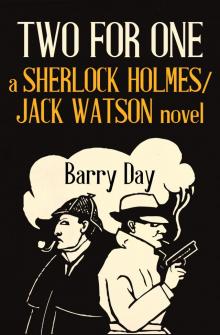 Two for One
Two for One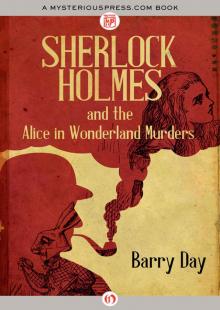 Sherlock Holmes and the Alice in Wonderland Murders
Sherlock Holmes and the Alice in Wonderland Murders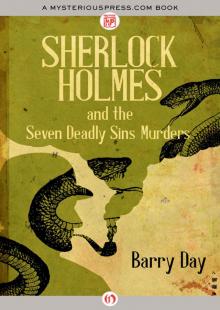 Sherlock Holmes and the Seven Deadly Sins Murders
Sherlock Holmes and the Seven Deadly Sins Murders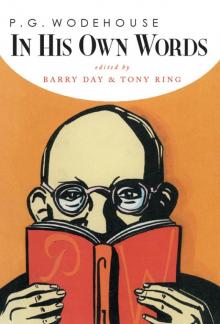 P.G. Wodehouse in his Own Words
P.G. Wodehouse in his Own Words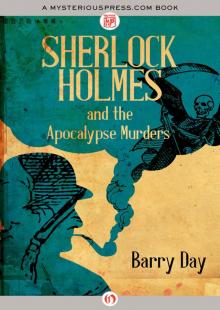 Sherlock Holmes and the Apocalypse Murders
Sherlock Holmes and the Apocalypse Murders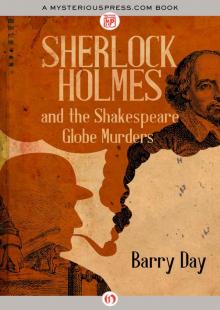 Sherlock Holmes and the Shakespeare Globe Murders
Sherlock Holmes and the Shakespeare Globe Murders